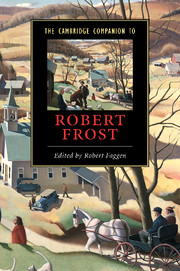Book contents
- Frontmatter
- Introduction
- 1 “Stay Unassuming”
- 2 Frost Biography and A Witness Tree
- 3 Frost and the Questions of Pastoral
- 4 Frost and the Ancient Muses
- 5 Frost as a New England Poet
- 6 “Across Spaces of the Footed Line”
- 7 Frost’s Poetry of Metaphor
- 8 Frost and the Meditative Lyric
- 9 Frost’s Poetics of Control
- 10 Frost’s Politics and the Cold War
- 11 “Synonymous with Kept”
- 12 Human Presence in Frost’s Universe
- Select bibliography
- Index
9 - Frost’s Poetics of Control
Published online by Cambridge University Press: 28 May 2006
- Frontmatter
- Introduction
- 1 “Stay Unassuming”
- 2 Frost Biography and A Witness Tree
- 3 Frost and the Questions of Pastoral
- 4 Frost and the Ancient Muses
- 5 Frost as a New England Poet
- 6 “Across Spaces of the Footed Line”
- 7 Frost’s Poetry of Metaphor
- 8 Frost and the Meditative Lyric
- 9 Frost’s Poetics of Control
- 10 Frost’s Politics and the Cold War
- 11 “Synonymous with Kept”
- 12 Human Presence in Frost’s Universe
- Select bibliography
- Index
Summary
British psychoanalyst and essayist Adam Phillips has suggested that “the contingent self enjoins us to imagine a life without blaming, a life exempt from the languages of effort and self-control.” To live a life without blame, and to be exempt from the language of self-control, ought to be good things. Much may be said in favor of flirtation, with its tolerations, and Phillips says it well. But notice the equation, by apposition, that informs his remarks: effort and self-control seem somehow essentially to involve blame - blame of others and of oneself. The contingent self Phillips is concerned to advance is in certain respects the opposite of the responsible self, at least from the point of view of conventional society, which is why it is usually something of a scandal. The contingent self really isn't, then, a “self” at all, as that term is properly understood. In any case, it is not a self in the legal sense: hence the concept of the “diminished capacity” of selves made contingent by neglect, abuse, insanity, poverty, immaturity. An ethics founded on the contingent self diminishes everyone's capacity: to do wrong, to be punished, to be condemned. Its language is always the language of mercy, which brings us to Robert Frost.
- Type
- Chapter
- Information
- The Cambridge Companion to Robert Frost , pp. 197 - 220Publisher: Cambridge University PressPrint publication year: 2001
- 1
- Cited by



